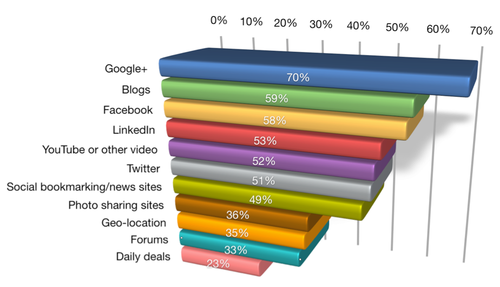
New Report: Marketers Still Embracing, Learning Social Media
A new report from Michael Stelzner and his team at Social Media Examiner reveals that social media adoption by marketers is growing steadily, but that we still have room to do more and have plenty of questions when it comes to measuring effectiveness. The 2012 Social Media Marketing Report found that and much more after surveying over 3,800 marketers from both the B2B and B2C worlds and from companies of all sizes. You can find the full report here, but I’ll share my key takeaways.
1) Nearly everyone has integrated social media into their marketing mix, but its perceived importance to their business overall is declining slightly.
While 94% of respondents are using social media to market their business, just 83% of them defined it as important for their business. When the same question was asked in 2011, that number was 90% (with 62% strongly agreeing). It may be surprising to see this slight decline, but I think we are probably looking at a natural progression as social media matures. In the olden days of social media (you know, the last few years), marketers were still getting comfortable with the medium. As the new kid on the block, social still had its shine and marketers were excited just to be using it. As we get more sophisticated about social though, it’s only natural that marketers might be getting more skeptical. In other words, the more knowledge you have about something, the easier it is to find its flaws. To be clear, this is a good sign. We can’t expect a medium to grow if we’re not asking the right questions about how to do so. My prediction is that as we get better at measuring results (see takeaway #2), we’ll see sentiment towards social media move back in a positive direction.
2) The top questions marketers have about social media point to a need for better results.
The number one question respondents had about social media (for three years running, no less) is how to measure the efficacy of their social media efforts. As discussed in the above point, marketers have moved beyond the learning stages of social media and are ready to start applying the same level of business accountability that we do other marketing programs. The second most asked question, how to best reach your target audience, points to the same growing pains. We’ve moved beyond just trying to get likes and shares. Instead, we’re ready to start making sure that our social audiences represent real business value. To do this, we must be sure that our efforts are focused on connecting with potential customers, not just on increasing audience size.
3) Experience with social media has a direct relationship with achieving revenue-generating objectives.
The correlation between a marketer’s experience using social media and the results they are able to generate is undeniable based on the report’s findings. Encouragingly, marketers across the board included improved sales (40%) and lead generation (58%) as benefits they derive from social media marketing. What I find most striking, though, is that both of these figures jump roughly 20% when looking at marketers with three or more years of social media experience. In fact, as illustrated in these two charts, there is a steady growth in the ability to drive revenue-generating results as a marketer’s experience with social media increases. What does this mean for you? Well, aside from reinforcing the fact that we are all learning more about how to be successful with social media as it matures, I would also suggest that you think twice about skimping when it comes to hiring the best person to handle your social media efforts. While that summer intern or new grad you’re bringing in may spend all of their waking hours posting LOLs and OMGs to their Facebook walls, they might not be the best person to manage your business’ social media if measurable results are a priority (hint: they should be). Business experience and judgement is important when looking for leaders in any part of your company; why would you treat social media any differently?
4) Worry not, there’s still plenty more to do.
Despite the medium’s maturation, social media marketing efforts still have plenty of room to grow. When asked how they will change their social media activities moving forward, a majority of respondents said they’ll be increasing their use of YouTube/video (76%), Facebook (72%), Twitter (69%), blogs (68%), Google+ (67%), and LinkedIn (66%). This is an encouraging sign for all of these platforms, but I particularly find interesting the number two position of Facebook. For a company that is consistently described by the tech blogosphere as uncool, peaked, or past its prime – some going as far as to describe it as experiencing a midlife crisis – there sure is a lot of interest in doing more with it. In fact, when asked what social media tools they wanted to learn more about, respondents had Facebook coming in at a close third behind the relatively new Google+ and the time-intensive medium of blogging.
Yes, not only do marketers want to increase their use of Facebook, but they also admit they have more to learn about it. To be honest, these results are refreshing. I think many in this industry have a tendency to get caught up in the hype of what’s fresh and new (see Pinterest and Google+ as recent examples). Don’t get me wrong, I think it’s vital to stay ahead of the curve on these things. I was an early advocate of Google+ (a position I still maintain) and I am actively using Pinterest for VerticalResponse. That said, though, it’s important to note that these pursuits shouldn’t occur at the detriment of your other efforts. For every company that makes the list of Top 20 Best Brand Timelines on Facebook, there are thousands more that are still getting the hang of it all. For these as much as all of us, Facebook is as relevant as ever, and these results help to confirm that.
Ultimately, I find these results promising. We are past the stage of questioning whether social media is a fad, and have moved on to the more productive discussion of what direction it is going to take and how best to measure its success. That’s a good thing for social media marketers like me, and that’s a good thing for business.
© 2012 – 2018, Contributing Author. All rights reserved.




Same here. but all i know is that social media is used if you want fast ROI! I noticed that it is effective and affordable. it also builds page authority.
I wonder how you can compute ROI on Social Media. Thanks for the great post.